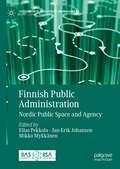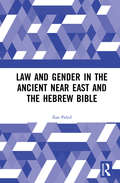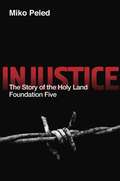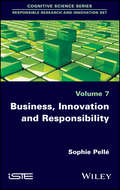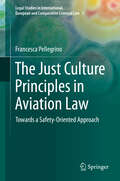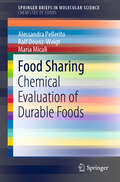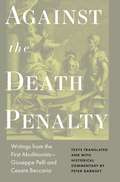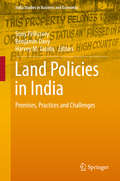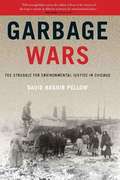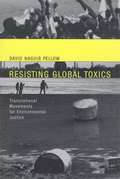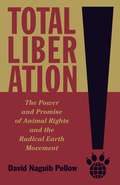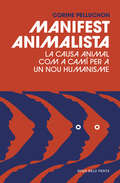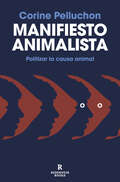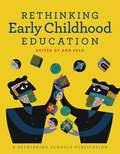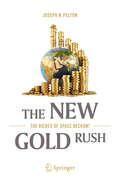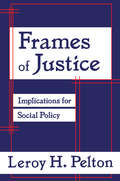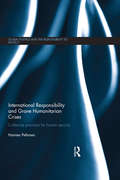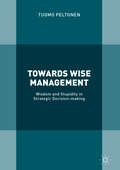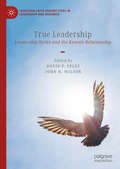- Table View
- List View
Finnish Public Administration: Nordic Public Space and Agency (Governance and Public Management)
by Elias Pekkola Jan-Erik Johanson Mikko MykkänenThis book provides a comprehensive analysis of public administration in Finland. Many of the basic structures of Finnish public administration have remained intact during the country’s relatively short independence of 100 years, but Finland has been able to tackle major turbulence ranging from wars and financial crises to the Covid-19 pandemic. Finland has also had to adjust to greater European integration, a new constitution, an ageing population, increased globalization of markets, and climate change. Chapters in this volume examine a wide range of themes pertinent to Finnish public administration, including government, regionalisation, health care policy, performance management, budgeting, and higher education policy. Placing these themes within the wider context of Nordic administrative developments, the book showcases public administration in Finland as pragmatism in action. It will appeal to students and scholars of public administration, public management, public policy and Nordic studies.
Making and Bending International Rules: The Design of Exceptions and Escape Clauses in Trade Law
by Krzysztof J. PelcAll treaties, from human rights to international trade, include formal exceptions that allow governments to legally break the rules that they have committed to, in order to deal with unexpected events. Such institutional 'flexibility' is necessary, yet it raises a tricky theoretical question: how to allow for this necessary flexibility, while preventing its abuse? Krzysztof Pelc examines how designers of rules in vastly different settings come upon similar solutions to render treaties resistant to unexpected events. Essential for undergraduate students, graduate students, and scholars in political science, economics, and law, the book provides a comprehensive account of the politics of treaty flexibility. Drawing on a wide range of evidence, its multi-disciplinary approach addresses the paradoxes inherent in making and bending international rules.
Law and Gender in the Ancient Near East and the Hebrew Bible
by Ilan PeledThis volume examines how gender relations were regulated in ancient Near Eastern and biblical law. The textual corpus examined includes the various pertinent law collections, royal decrees and instructions from Mesopotamia and Hatti, and the three biblical legal collections. Peled explores issues beginning with the wide societal perspective of gender equality and inequality, continues to the institutional perspective of economy, palace and temple, the family, and lastly, sex crimes. All the texts mentioned or referred to in the book are given in an appendix, both in the original languages and in English translation, allowing scholars to access the primary sources for themselves. Law and Gender in the Ancient Near East and the Hebrew Bible offers an invaluable resource for anyone working on Near Eastern society and culture, and gender in the ancient world more broadly.
Injustice: The Story of the Holy Land Foundation Five
by Miko Peled<p>In July 2004, federal agents raided the homes of five Palestinian-American families, arresting the five dads. The first trial of the "Holy Land Foundation Five" ended in a hung jury. The second, marked by highly questionable procedures, resulted in very lengthy sentences--for "supporting terrorism" by donating to charities that the U.S. government itself and other respected international agencies had long worked with. <p>In 2013, human rights activist and author Miko Peled started investigating this case. He discussed the miscarriages of justice with the men's lawyers and heard from the men's families about the devastating effects the case had on their lives. He also traveled to the remote federal prison complexes where the men were held to conduct deep interviews. Injustice traces the labyrinthine course of this case, presenting a terrifying picture of governmental over-reach in post-9/11 America.</p>
On Repentance: The Thought and Oral Discourses of Rabbi Joseph Dov Soloveitchik
by Pinchas H. PeliFor five decades prior to his death in 1993, Rabbi Joseph Dov Soloveitchik was the unchallenged leader of modern Orthodox Judaism in the United States. His understanding of both traditional Judaism and secular philosophy shaped two generations of rabbinic students at Yeshiva University, and charted a new course for American Orthodox Jews. In On Repentance, noted scholar Pinchas Peli has gathered the major points of Rabbi Soloveitchik's teachings on teshuvah (repentance), based on the annual series of lectures on the theme of teshuvah, presented on the anniversary of his father's death. For many Jews, these lectures were the major academic and intellectual event of the year. Outside of his followers however, few were able to experience the genius of Rabbi Soloveitchik. He gave his lectures in Yiddish, and generally refused to publish. Now readers can experience the brilliant thinking of this great teacher and sage.
Interpreting the Bible and the Constitution
by Jaroslav PelikanBoth the Bible and the Constitution have the status of "Great Code," but each of these important texts is controversial as well as enigmatic. They are asked to speak to situations that their authors could not have anticipated on their own. In this book, one of our greatest religious historians brings his knowledge of the history of biblical interpretation to bear on the question of constitutional interpretation. Jaroslav Pelikan compares the methods by which the official interpreters of the Bible and the Constitution - the Christian Church and the Supreme Court, respectively - have approached the necessity of interpreting, and reinterpreting, their important texts. In spite of obvious differences, both texts require close, word-by-word exegesis, an awareness of opinions that have gone before, and a willingness to ask new questions of old codes, Pelikan observes. He probes for answers to the question of what makes something authentically "constitutional" or "biblical," and he demonstrates how an understanding of either biblical interpretation or constitutional interpretation can illuminate the other in important ways. --BOOK JACKET. Title Summary field provided by Blackwell North America, Inc. All Rights Reserved
Business, Innovation and Responsibility
by Sophie PelléResponsible Innovation. For some, this expression is only an oxymoron or, worse, a means of masking with a sheet of virtue economic practices that would otherwise appear selfish and self-interested. For others, theorists and actors of innovation, this expression represents a formidable lever of action and a rich conceptual source from which to draw new ways of innovating. The articulation between different levels of norms – economic and ethical, to which we can add the legal dimension – is not new, and is the subject of an in-depth reflection, decades old, around the idea of Corporate Social Responsibility (CSR). By taking up some debates on CSR, most of which are foreign to the current authors of responsible innovation, this book examines the various justifications that CSR brings in order to convince economic players, subject to powerful market forces, of their responsible commitment. But these are not enough. The book also explores the specific contribution of the concept of responsible innovation to coping with the technological, social and political breakthroughs generated by innovation, and is based on philosophical resources such as the ethics of virtue and the ethics of “care”.
Love the Sin: Sexual Regulation and the Limits of Religious Tolerance (Sexual Cultures #39)
by Ann Pellegrini Janet R. JakobsenSex. Religion. There is no denying that these two subjects are among the most provocative in American public life. Even the constitutional principle of church-state separation seems to give way when it comes to sex: the Supreme Court draws on theology as readily as it draws on case law when rendering decisions that touch on sexuality.In this compelling and carefully argued study, Janet R. Jakobsen and Ann Pellegrini examine this powerful and disturbing connection as they explore the reasons why secular institutions habitually use religion to regulate sexual life. From state legislatures to the halls of Congress and the Supreme Court, from daily newspapers to popular magazines and television talk shows, Jakobsen and Pellegrini illustrate the intensity of America's obsession with sex in the name of values and the dangers it poses to some of our most basic freedoms. Using a wide range of case studies, Love the Sin offers an insightful critique of the ways in which sexuality in general and homosexuality in particular are discussed and debated in the public arena. Additionally, the book sets forth constructive alternatives that highlight the vital links between sexual and religious freedom and expose the hazards of using religion as a justification for regulating sexuality.A timely, necessary, and refreshing contribution to the many debates surrounding religion, morality, and sex, Love the Sin boldly dreams an America that lives up to its promise of freedom and justice for all.
The Just Culture Principles in Aviation Law: Towards a Safety-Oriented Approach (Legal Studies in International, European and Comparative Criminal Law #3)
by Francesca PellegrinoThis book reviews and critically analyzes the current legal framework with regard to a more just culture for the aviation sector. This new culture is intended to protect front-line operators, in particular controllers and pilots, from legal action (except in the case of willful misconduct or gross negligence) by creating suitable laws, regulations and standards. In this regard, it is essential to have an environment in which all incidents are reported, moving away from fears of criminalization. The approach taken until now has been to seek out human errors and identify the individuals responsible. This punitive approach does not solve the problem because frequently the system itself is (also) at fault. Introducing the framework of a just culture could ensure balanced accountability for both individuals and complex organizations responsible for improving safety. Both aviation safety and justice administration would benefit from this carefully established equilibrium.
Food Sharing: Chemical Evaluation of Durable Foods (SpringerBriefs in Molecular Science)
by Alessandra Pellerito Ralf Dounz-Weigt Maria MicaliThis book presents the concept of food sharing from a European perspective, and provides a concise analysis of its safety implications and the chemical properties of recovered foods.In our modern world, 33% of the total food produced is lost each year, with serious economic, environmental and social consequences. Food worth approximately 1 trillion USD is wasted per year, and it is estimated that this wasted food could feed more than 3.4 billion people. Considering that 1/10 of the global population still does not have enough money for basic needs, and in view of the impact of consumer behaviour, food retailers and industry in food waste, food sharing appears to be an attractive solution, and several communities have recently been created with the main goal of saving food and giving it to those in need. Despite the positive impact of food sharing, it also raises concerns since recovered foods are subject to spoilage, decay and irreversible chemical-physical transformations.In this book, the authors explore the current situation and the regulatory definition of food sharing in various European countries, presenting the German experience in the city of Magdeburg, where food-sharing networks have been implemented. They also discuss the chemical and safety evaluations of durable foods, and provide a simulation of food waste by comparing a food product with the same food produced with re-worked and still edible raw materials (recovered foods).
Against the Death Penalty: Writings from the First Abolitionists—Giuseppe Pelli and Cesare Beccaria
by Giuseppie PelliThe first known abolitionist critique of the death penalty—here for the first time in EnglishIn 1764, a Milanese aristocrat named Cesare Beccaria created a sensation when he published On Crimes and Punishments. At its centre is a rejection of the death penalty as excessive, unnecessary, and pointless. Beccaria is deservedly regarded as the founding father of modern criminal-law reform, yet he was not the first to argue for the abolition of the death penalty. Against the Death Penalty presents the first English translation of the Florentine aristocrat Giuseppe Pelli's critique of capital punishment, written three years before Beccaria's treatise, but lost for more than two centuries in the Pelli family archives.Peter Garnsey examines the contrasting arguments of the two abolitionists, who drew from different intellectual traditions. Pelli was a devout Catholic influenced by the writings of natural jurists such as Hugo Grotius, whereas Beccaria was inspired by the French Enlightenment philosophers. While Beccaria attacked the criminal justice system as a whole, Pelli focused on the death penalty, composing a critique of considerable depth and sophistication. Garnsey explores how Beccaria's alternative penalty of forced labour, and its conceptualisation as servitude, were embraced in Britain and America, and delves into Pelli's voluminous diaries, shedding light on Pelli's intellectual development and painting a vivid portrait of an Enlightenment man of letters and of conscience.With translations of letters exchanged by the two abolitionists and selections from Beccaria's writings, Against the Death Penalty provides new insights into eighteenth-century debates about capital punishment and offers vital historical perspectives on one of the most pressing questions of our own time.
Land Policies in India: Promises, Practices and Challenges (India Studies in Business and Economics)
by Sony Pellissery Benjamin Davy Harvey M. JacobsThis book examines how property rights are linked to socio-economic progress and development. It also provides a theoretical analysis, an economic/social analysis of planning, case studies of the implementation of planning and regulation instruments, practices related to law and planning, analysis of case laws in a particular segment. The interconnection between property, law and planning is a running theme throughout the book. The land question has been central to South Asian development on two counts: First, although the majority of the population relies on agriculture and allied activities their livelihood, landholding is highly skewed; second, urban planning is facing unprecedented challenges due to bourgeoning property values as well as gush of migrants to cities seeking livelihood. The response to these challenges in the form of laws and policies has been very large compared to the academic attention that is received. However, the measures emerging from planning and policies have had limited impact on the extent of the problems. This paradox calls for serious introspection and academic engagement that this book undertakes. The book further deals with the emerging discipline of planning law, which determines property value and use, and argues that regulatory issues of public policy determine the property valuation and property pricing.
Garbage Wars: The Struggle For Environmental Justice In Chicago (Urban And Industrial Environments Ser.)
by David PellowIn Garbage Wars, the sociologist David Pellow describes the politics of garbage in Chicago. He shows how garbage affects residents in vulnerable communities and poses health risks to those who dispose of it. He follows the trash, the pollution, the hazards, and the people who encountered them in the period 1880-2000. What unfolds is a tug of war among social movements, government, and industry over how we manage our waste, who benefits, and who pays the costs. Studies demonstrate that minority and low-income communities bear a disproportionate burden of environmental hazards. Pellow analyzes how and why environmental inequalities are created. He also explains how class and racial politics have influenced the waste industry throughout the history of Chicago and the United States. After examining the roles of social movements and workers in defining, resisting, and shaping garbage disposal in the United States, he concludes that some environmental groups and people of color have actually contributed to environmental inequality. By highlighting conflicts over waste dumping, incineration, landfills, and recycling, Pellow provides a historical view of the garbage industry throughout the life cycle of waste. Although his focus is on Chicago, he places the trends and conflicts in a broader context, describing how communities throughout the United States have resisted the waste industry's efforts to locate hazardous facilities in their backyards. The book closes with suggestions for how communities can work more effectively for environmental justice and safe, sustainable waste management.
Resisting Global Toxics: Transnational Movements for Environmental Justice
by David Naguib PellowEvery year, nations and corporations in the "global North" produce millions of tons of toxic waste. Too often this hazardous material--linked to high rates of illness and death and widespread ecosystem damage--is exported to poor communities of color around the world. In Resisting Global Toxics,David Naguib Pellow examines this practice and charts the emergence of transnational environmental justice movements to challenge and reverse it. Pellow argues that waste dumping across national boundaries from rich to poor communities is a form of transnational environmental inequality that reflects North/South divisions in a globalized world, and that it must be theorized in the context of race, class, nation, and environment. Building on environmental justice studies, environmental sociology, social movement theory, and race theory, and drawing on his own research, interviews, and participant observations, Pellow investigates the phenomenon of global environmental inequality and considers the work of activists, organizations, and networks resisting it. He traces the transnational waste trade from its beginnings in the 1980s to the present day, examining global garbage dumping, the toxic pesticides that are the legacy of the Green Revolution in agriculture, and today's scourge of dumping and remanufacturing high tech and electronics products. The rise of the transnational environmental movements described in Resisting Global Toxicscharts a pragmatic path toward environmental justice, human rights, and sustainability.
Total Liberation
by David Naguib PellowWhen in 2001 Earth Liberation Front activists drove metal spikes into hundreds of trees in Gifford Pinchot National Forest, they were protesting the sale of a section of the old-growth forest to a timber company. But ELF's communiqué on the action went beyond the radical group's customary brief. Drawing connections between the harms facing the myriad animals who make their home in the trees and the struggles for social justice among ordinary human beings resisting exclusion and marginalization, the dispatch declared, "all oppression is linked, just as we are all linked," and decried the "patriarchal nightmare" in the form of "techno-industrial global capitalism." In Total Liberation, David Naguib Pellow takes up this claim and makes sense of the often tense and violent relationships among humans, ecosystems, and nonhuman animal species, expanding our understanding of inequality and activists' uncompromising efforts to oppose it. Grounded in interviews with more than one hundred activists, on-the-spot fieldwork, and analyses of thousands of pages of documents, websites, journals, and zines, Total Liberation reveals the ways in which radical environmental and animal rights movements challenge inequity through a vision they call "total liberation." In its encounters with such infamous activists as scott crow, Tre Arrow, Lauren Regan, Rod Coronado, and Gina Lynn, the book offers a close-up, insider's view of one of the most important--and feared--social movements of our day. At the same time, it shows how and why the U.S. justice system plays to that fear, applying to these movements measures generally reserved for "jihadists"--with disturbing implications for civil liberties and constitutional freedom. How do the adherents of "total liberation" fight oppression and seek justice for humans, nonhumans, and ecosystems alike? And how is this pursuit shaped by the politics of anarchism and anticapitalism? In his answers, Pellow provides crucial in-depth insight into the origins and social significance of the earth and animal liberation movements and their increasingly common and compelling critique of inequality as a threat to life and a dream of a future characterized by social and ecological justice for all.
Power, Justice, and the Environment: A Critical Appraisal of the Environmental Justice Movement
by David Naguib Pellow Robert J. BrulleThis book provides a critical appraisal, examining EJM's tactics and strategies, rhetoric, organizational structure, and resource base. With chapters by both scholars and activists, the book links theory and practice with the aim of contributing to a more effective movement.
Manifest animalista: La causa animal com a camí per a un nou humanisme
by Corine PelluchonLa violència contra els animals és un atac directe a la nostra humanitat. Això demostra Corine Pelluchon en aquest breu, pragmàtic, i controvertit assaig que suposa una contribució radical a l'ètica i la filosofia política. Lluitar contra el maltractament animal és rebel·lar-se contra una societat basada en l'explotació, i per això la causa animalista és una qüestió política major que ens concerneix a tots, més enllà d'ideologies o conflictes d'interessos. Amb un estil viu, persuasiu i inspirador, l'autora proposa un camí possible i factible per portar aquest debat a l'esfera política amb tanta claredat i urgència com sigui possible. Ressenyes:«Corine Pelluchon ho explica tot absolutament bé en tot just un centenar de pàgines: per ser una alternativa vàlida, és imprescindible polititzar la causa animal.»Luce Lapin, Charlie Hebdo «L'objectiu principal de l'autora està completament assolit en aquest Manifest animalista: dóna al lector les claus que li permetran ampliar el radi d'acció de l'humanisme als animals.»Philippe Douroux, Libération «Una perspectiva bella i ambiciosa.»Isabelle Gravillon, Femme Majuscule «Un llibre d'intervenció política, tan compromès com lúcid.»Robert Jules, La Tribune «Una de les moltes i grans qualitats d'aquest Manifest animalista és que, en tot moment, el seu projecte està exposat de manera perfectament creïble i realitzable. Precisament per això, l'autora no es fa cap il·lusió sobre la dificultat que suposa introduir la qüestió animal en el debat polític.»Hicham-Stéphane Afeissa, Non Fiction
Manifiesto animalista
by Corine PelluchonLa violencia contra los animales es un ataque directo a nuestra humanidad. Eso demuestra Corine Pelluchon en este breve ensayo, pragmático, controvertido y que supone una contribución radical a la ética y la filosofía política. <P><P>Luchar contra el maltrato animal es rebelarse contra una sociedad basada en la explotación, y por ello la causa animalista es una cuestión política mayor que nos concierne a todos, más allá de ideologías o conflictos de intereses. <P>Con un estilo vivo, persuasivo e inspirador, la autora propone un camino posible y factible para llevar el debate a la esfera política con tanta claridad y urgencia como sea posible.
Manifiesto animalista: Politizar la causa animal
by Corine PelluchonLa violencia contra los animales es un ataque directo a nuestra humanidad. Eso demuestra Corine Pelluchon en este breve ensayo, pragmático, controvertido y que supone una contribución radical a la ética y la filosofía política. «Un libro intenso, pese a su brevedad, de acción, llamado a marcar época. [...] Una propuesta clara y concisa para avanzar de manera decisiva en nuestra relación con los animales».Jacinto Antón, El País Luchar contra el maltrato animal es rebelarse contra una sociedad basada en la explotación, y por ello la causa animalista es una cuestión política mayor que nos concierne a todos, más allá de ideologías o conflictos de intereses. Con un estilo vivo, persuasivo e inspirador, la autora propone un camino posible y factible para llevar el debate a la esfera política con tanta claridad y urgencia como sea posible. Reseñas:«No exento de polémica, Manifiesto animalista, no pretende aleccionar moralmente a nadie, ni siquiera pretende convertirnos en animalistas, sino poner al lector, ciudadano, al fin y al cabo, en la meta de salida de un proceso de auto conversión e introspección. [...] Un cambio a varios niveles y que venga desde diferentes ámbitos: una nueva era, la de los seres vivientes, que deje atrás el antropocentrismo y que ponga el acento en nuestra manera de habitar la tierra».Queralt Castillo Cerezuela, Público«Un texto corto, directo y con propuestas muy concretas. Un panfleto que rompe la brecha entre la teoría y la práctica y va encaminado hacia la acción. Y en su país han recogido el guante. [...] La mejor muestra de que la lucha por los derechos de los animales ha traspasado ya la linde del mero activismo».Paula Corroto, El País «El ensayo dela doctora en filosofía Pelluchon irrumpe en la sociedad del siglo XXI como una verdadera catarsis del espíritu».LA.Network «Un nuevo paradigma del movimiento animalista mundial. [...] Un libro intenso, pese a su brevedad, de acción, llamado a marcar época y que constituye a la vez un estado de la cuestión, una declaración de intenciones y una propuesta clara y concisa para avanzar de manera decisiva en nuestra relación con los animales».Jacinto Antón, El País «La voz del animalismo».Núria Navarro, El Periódico«Un nombre de referencia del antiespecismo que busca convencer, no vencer a cualquier precio. [...] Manifiesto animalista resuena más necesaria que nunca.»Igor López, ICON «Corine Pelluchon lo explica todo absolutamente bien en apenas un centenar de páginas: para ser una alternativa válida, politizar la causa animal es imprescindible.»Luce Lapin, Charlie Hebdo«El objetivo principal de la autora está completamente logrado en este Manifiesto animalista: le da al lector las claves que le permitirán ampliar el radio de acción del humanismo a los animales.»Philippe Douroux, Libération «Una perspectiva bella y ambiciosa.»Isabelle Gravillon, Femme Majuscule«Un libro de intervención política, tan comprometido como lúcido.»Robert Jules, La Tribune «Una de las muchas y grandes cualidades de este Manifiesto animalista es que, en todo momento, su proyecto está expuesto de manera perfectamente creíble y realizable. Precisamente por eso, la autora no se hace ninguna ilusión sobrela dificultad que supone introducir la cuestión animal en el debate político.»Hicham-Stéphane Afeissa, Non Fiction
Rethinking Early Childhood Education
by Ann PeloIt shows how educators can nurture empathy, ecological consciousness, curiosity, collaboration, and activism in young children. It invites readers to rethink early childhood education, reminding them that it is inseparable from social justice and ecological education. An outstanding resource for childcare providers, early-grade teachers, and teacher education and staff development programs.
The New Gold Rush: The Riches of Space Beckon!
by Joseph N. PeltonThis book captures the most exciting advances in the harnessing of space as a global resource. The authors track the growing number of space businesses and opportunities for investors, and the many possible benefits of spaceplanes, space stations and even space colonies. The authors also discuss the need for more regulatory reform. Companies like Planetary Resources are now forming to find mineral-rich asteroids and bring back new riches to Earth. Solar power satellites in the next few years will start to beam clean energy back to Earth, to meet the growing demands of a still-developing world. Innovative space industries are vital to the survival of modern human life, and the authors demonstrate what can be done to encourage the growing of the "New Space" frontier. From lassoing and then mining asteroids to developing new methods of defending the planet from space hazards and setting up new hotels and adventures for tourists in space, this new industry will have profound effects on Earth, especially on its economy. This book is based on a study of international experts commissioned ahead of the UNISPACE+50 meeting, having distilled the results of this comprehensive fact-finding process into a compact and very readable form. It can serve as an excellent starting point for understanding all the activities underway or planned to make space truly our next frontier.
Frames of Justice: Implications for Social Policy
by Leroy H. PeltonThis work is devoted to analyzing three major frames of justice--group justice, individual desert, and life affirmation--and their implications for social policy as well as their reflections in contemporary social policies. Pelton finds that all three frames of justice are reflected in the Bible and, later, the Koran. He contends that there is no evidence in the Bible of a genesis or development from one frame of justice to another. Rather, a sense of justice has existed in the human mind from time immemorial, with the three frames coexisting and manifesting themselves in both inter- and intra-group relations. The prominence of one frame over another at any particular point in history or in a particular geographical location is influenced by a variety of factors, though it is ultimately open to human choice.Pelton compares and contrasts the philosophies of nonviolence and liberalism in regard to the frames, and explores the relationships between principle, sentiment, reason, justice, and policy. He discusses social science's problematic relationship to justice in policymaking--for instance, how scholars have focused more on the effectiveness of policies, largely in terms of statistical outcomes reflecting aggregate data analyses, than on their justice. He goes on to explore in depth how frames of justice give direction to social policies, including those of genocide.Frames of Justice is an outstanding work that analyzes the question of justice and social policy, while simultaneously exploring the notion of desert in religion, philosophy, and legislation--especially within the context of the moral question of the relationship between means and ends--and contrasting it with the principle of life affirmation.
International Responsibility and Grave Humanitarian Crises: Collective Provision for Human Security (Global Politics and the Responsibility to Protect)
by Hannes PeltonenThis book examines responsibility in grave humanitarian crises, focusing on the international community's collective responsibility to take action in such cases as genocide or ethnic cleansing. The idea of collective responsibility highlights how we would like to see the global level primarily as something more akin to a community of peoples, rather than as a society of states in which other international and transnational actors operate. Since the acceptance of human rights, and in view of the atrocities of the Holocaust and other genocides, we have realized that some things concern us all: a realization that has led to the development of the responsibility to protect (R2P) framework. This book focuses on understanding the international community and its collective responsibility. Unlike the research frameworks put forward in other publications on this topic, the research model developed here does not distribute the collective responsibility to particular actors; instead, it sets out how the burden should be divided among those actors responsible in order to protect human security on a global scale. This book will be of interest to students of humanitarian intervention, the responsibility to protect, international law, peace and conflict studies, and international relations in general.
Towards Wise Management: Wisdom and Stupidity in Strategic Decision-making
by Tuomo PeltonenThis book contributes to the discussion on wisdom in management, leadership and strategy by developing a unique theoretical approach. Integrating rational-analytical, intuitive and philosophical dimensions of wise decision-making, it advocates a broadly Platonic-Socratic view on wisdom. Applying a developed framework of wisdom dynamics, it analyses a number of decision-making case studies in order to discuss the potential of and obstacles to the use of wisdom in broader organizational trends, from the Cuban Missile Crisis to the downfall of Nokia.
True Leadership: Leadership Styles and the Kenotic Relationship (Christian Faith Perspectives in Leadership and Business)
by David P. Peltz John H. WilsonThis edited collection addresses several forms of moral leadership within the context of kenosis, bringing together both secular and biblical perspectives on the role of morality and self-sacrifice in effective leadership theory and practice. The contributors apply various leadership theories in the analysis of sacred texts in order to uncover unique insights into the biblical truth about leadership. Their analysis moves away from egotistical leadership focused on self-aggrandizement and provides a new model for leadership - one characterized by morality, authenticity, and service. True Leadership will benefit scholars, researchers, and students interested in values-based leadership and seeking to enrich their understanding of organizational behavior and leadership development.
